Pendleton to Become Training Camp for Marine Motherhood
- Share via
The Marine Corps, tradition-rich in turning boys into fighting men, is now offering basic training to turn young mothers into more effective parents.
With the help of Children’s Hospital and Health Center in San Diego, mothers of newborns at Camp Pendleton--some of whom are still teen-agers themselves and green in parenting skills--will be able to call upon specially trained home visitors for positive role modeling, emotional support and crisis intervention.
The program, announced at a press conference Tuesday, is being tried for a year at Camp Pendleton with an $85,000 grant from the Marine Headquarters Family Advocacy Center in Washington. If successful, it will be introduced at other Marine Corps bases around the country. The Navy is embarking on a similar program for its bases, although none exists now in San Diego County.
Advice or Just a Shoulder
The program calls for Children’s Hospital’s Center for Child Protection to train home visitors, some who will be on the military payroll, others who will volunteer for the esprit de corps.
The visitors will, at the invitation of the new mothers, visit the women at home and be available by phone around-the-clock to offer counseling, advice or simply an empathic ear if the mother needs a sounding board in coping with the newborn.
The program will also offer parenting-skills classes and support groups at which mothers can share their war stories about caring for babies.
The thrust of the program, officials say, is to create an extended family for the young wife of a Marine who might otherwise feel isolated or without anyone to turn to when, for instance, the baby won’t stop crying at 3 a.m. and Mom is at her wit’s end.
The program won’t want for potential participants: About 4,700 Marine families live at Camp Pendleton, and more than 200 babies of Marines are born monthly on base or in nearby community hospitals.
The new offensive to improve home life is another example of how the Marine Corps philosophy toward family life has changed over the past decade. For years, the popular saying was, “If the Marine Corps had wanted you to have a wife, it would have issued you one.”
Identified Weak Link
But the corps identified the weak link in its mission to train troops and send them off to combat: the care and feeding of the young families at home.
Surveys of those who have not re-enlisted in the Marines point to three areas of disillusionment: pay, travel and transiency, and family problems--especially the stress on young mothers trying to raise their families in strange cities where they may have no relatives, few friends and a perceived lack of support from the military establishment.
Bases throughout the country today are providing a greater menu of family support services. Camp Pendleton, which established its Family Service Center in 1980, and which today is the largest such center in the Marine Corps, offers a variety of programs.
“But until now, we’ve been telling the mothers to come by and visit us and we’ll help,” said David Lara-Toney, deputy director of the Family Service Center at Camp Pendleton. “But a lot weren’t able to come in for whatever reason, or didn’t want to. Now we will be able to reach out more to them, in their own homes.”
Lara-Toney acknowledged that the new-mother support program has a military mission.
“Family problems are (military) mission problems. We can no longer complete our mission unless families are taken care of,” he said. “And we have a saying: ‘Marines, taking care of our own.’ ”
Child Abuse May Drop
“We spend millions of dollars in training, and, if a Marine leaves, we have to train a new one,” Lara-Toney said. “But, if we can provide support for families so they won’t want to leave, that reduces the cost of training by millions.”
The corps also hopes that the program will reduce child abuse on base, which averages about 25 cases a month. Factors that contribute to child abuse are especially rife among young military families: stress, lack of family support and absence of coping skills.
“In many instances, a young mother must cope with the burden of caring for children alone and worrying about her husband’s deployment, in addition to being far from her own home,” said Diana Gordon, director of the 14-year-old Parent Aide Program at Children’s Hospital, which is serving as the model for the new Camp Pendleton program.
The hospital’s program serves about 100 families. But Dr. David Chadwick, director of its Center for Child Protection, estimated that tens of thousands of families in the county could benefit from the service and said Marine mothers stand to gain as well.
“Everybody has family problems. The nuclear family is no longer sufficient. Parents alone can rarely do the job. It takes role modeling and an extended family,” he said.
Chadwick credited the Marine Corps for trying to create a sense of extended family for the young mothers on base through the home-visitors program.
He said the home visitors might be more openly received by a young mother seeking support or advice than her own mother or mother-in-law would be.
The program calls for about six paid home visitors to spend about 10 hours a week on base, supplemented by as many experienced mothers there as will volunteer.
The home visitors will help the mother as long as support is needed, officials say.
More to Read
Sign up for Essential California
The most important California stories and recommendations in your inbox every morning.
You may occasionally receive promotional content from the Los Angeles Times.













